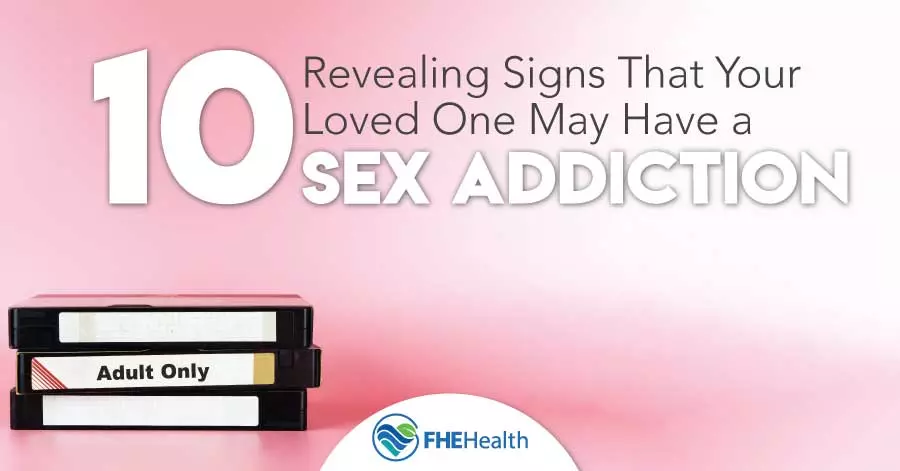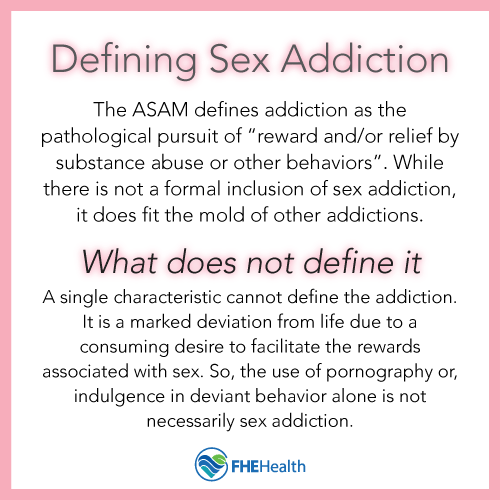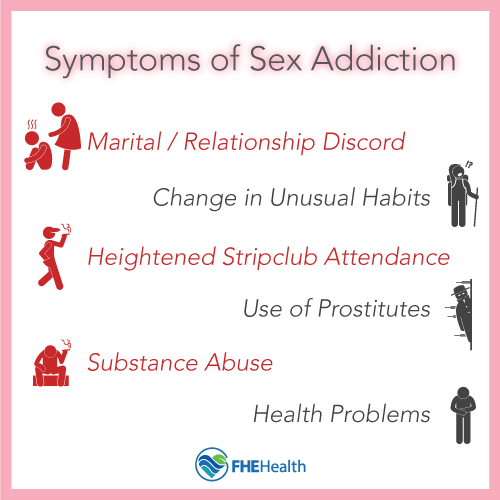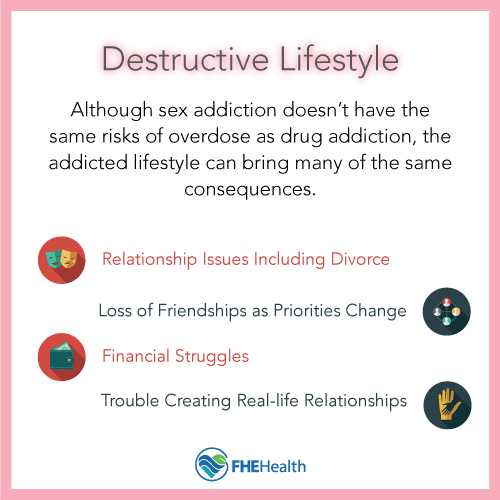
According to pop culture, addiction is largely limited to drugs and alcohol. However, this actually isn’t the whole truth. Virtually any pleasurable activity can become the subject of an addiction, and that extends to sex. And, like other forms of addiction, getting help is highly recommended to tame symptoms and minimize the likelihood of consequences to normal life, like jobs and relationships.
Sex addiction is commonly overlooked due to its infrequency. Only around 3 to 6 percent of individuals will develop a sexual addiction-related disorder. Further, many people are uncomfortable discussing sexual topics and thus are unlikely to talk about their struggles. In spite of this, silence doesn’t negate reality. Across the country, millions of Americans struggle to keep sex addiction under control each and every day.
What Is Sex Addiction?
 Sex addiction refers to a compulsive need to engage in sexual behaviors. Unlike the average person who is satisfied with the sensations that come with sexual activity, sex addiction results in an ongoing need for sexual satisfaction in ways that often go beyond normal interactions. In many ways, sex addiction manifests in a similar way to substance addictions — in these cases, sex itself functions like a drug and provides a high.
Sex addiction refers to a compulsive need to engage in sexual behaviors. Unlike the average person who is satisfied with the sensations that come with sexual activity, sex addiction results in an ongoing need for sexual satisfaction in ways that often go beyond normal interactions. In many ways, sex addiction manifests in a similar way to substance addictions — in these cases, sex itself functions like a drug and provides a high.
Sex addiction does not necessarily indicate extensive sexual activity; some sex offenders will never go beyond chronic masturbation. However, there is occasionally a correlation with delinquent behavior. Research has indicated that as many as 55 percent of sex offenders may be sex addicts. While sex addiction is normally thought of as distinctly male behavior, women can indeed be sex addicts and show many of the same symptoms.
For some people who deeply enjoy sex, identifying the boundaries between a healthy appreciation and an addiction can be both difficult and concerning. However, these two characteristics are not one and the same. There’s nothing wrong with a high sex drive, but those with a disorder take this a step further, displaying a lack of control over sexual appetite and a high frequency of negative consequences related to sex. Urges are often insatiable, to the point that even multiple sessions a day aren’t enough.
Sex Addiction Signs & Symptoms
 Identifying a sex addiction is often a challenge, particularly in those with whom you do not have a sexual relationship, like parents or close friends, but there are still often clear indicators of a problem. Keep an eye out for these 10 signs of sex addiction behavior.
Identifying a sex addiction is often a challenge, particularly in those with whom you do not have a sexual relationship, like parents or close friends, but there are still often clear indicators of a problem. Keep an eye out for these 10 signs of sex addiction behavior.
1. Marital and Relationship Discord
Unless a sex addict is married to someone in the same position, it’s not uncommon for a growing addiction to cause problems in a relationship. If one partner can’t keep up with the other’s needs, feelings of resentment, inadequacy and anger may arise in both parties. If a previously happy relationship appears to be strained or on the rocks, sex addiction may be the cause of growing tensions.
2. Changes in Usual Habits
As sex addiction deepens, it’s not uncommon for aspects of normal life, like holding a job or paying bills, to start to fall by the wayside. As with drug addiction, regular obligations lose priority in the context of abusive behavior. When sex is the sole priority, other parts of life may become irrelevant. If hobbies begin to switch to sex (from art, writing, or video games, for example), addiction may be at hand.
3. Heightened Strip Club Attendance
When sex itself is unavailable or inadequate, third-party sources may become a convenient choice. Those with sex addictions regularly invest time in strip clubs, observing others and paying for contact. While most strip clubs in the U.S. do not permit extensive physical contact, some may be willing to provide extra services in back rooms, providing an outlet for sexual frustration outside of the confines of a relationship.
4. Use of Prostitutes
Despite the illegality of prostitution in the vast majority of the United States, some individuals with an addiction to sex regularly seek out prostitutes. Using prostitutes can raise red flags. Due to the unsafe nature of engaging in sex with unknown individuals and the potential for legal charges related to illegal activity, resorting to this alternative can be indicative of a serious problem in need of immediate assistance.
5. Excessive Porn Use
Pornography use is a complex topic, but many people are able to use it in moderation without affecting their day-to-day life, but those who have a sex addiction may make porn use a key part of functioning. Those with an extreme interest in porn may begin to deviate from more accepted and standard viewing categories into controversial subject matter, including violent or potentially nonconsensual proclivities.
6. Substance Abuse
In many cases, those who are facing sex addiction are consistently searching for the next high, and sometimes, sex doesn’t accomplish those goals. Drug use, like taking ecstasy, can also be used to heighten experiences in sexual activity, so this can contribute as well. For others, drugs or alcohol may be used out of shame for illicit behaviors or in an attempt to numb the overwhelming desire for sex.
7. An Increase in Risky Behavior
When sex is no longer providing the pleasure necessary, risky activities may become routine. In order to recreate the high provided by sex in those who cannot meet their needs organically, it’s not uncommon to do other things that may provide a rush, like car racing, picking fights, or skydiving. While some risky activities may be legal, others may not be, leading to an increased likelihood of physical harm or legal penalties.
8. Health Problems
Regular sex is generally a healthy — or, at worst, neutral — behavior, but those with sex addictions are at increased risk for taking things too far. Statistically, sex addiction often contributes to things like sex without the use of condoms and, consequently, an increased likelihood of STDs and serious conditions like HIV. If health concerns arise in those showing other signs, high-risk sex may be the cause.
9. Secrecy
Actions surrounding sex addiction tend to be the kind of conditions affected individuals are not willing to openly discuss, particularly for those who feel shame or confusion about their feelings. As such, it’s natural for sex addicts to go to extreme lengths to hide the extent to which they engage in sexual behaviors, like visiting prostitutes, having one-night stands or attending strip clubs, in a way similar to how drug addicts hide or deny abuse.
10. Financial Problems
The costs of maintaining a drug or alcohol addiction are clear, but this doesn’t mean other addictions can’t lead to financial problems. While sex addiction doesn’t have to cost money, feeding needs may get to that point. Regular activity in strip clubs, at sex clubs or with prostitutes can start to add up, taking money away from things like food, rent and bills.
The Consequences of Sex Addiction
 Like other forms of addiction, sex addiction can have serious ramifications on quality of life. While overdose risk doesn’t exist as with drug and alcohol use disorders, associated behavioral issues can create problems in both personal and professional endeavors. These include:
Like other forms of addiction, sex addiction can have serious ramifications on quality of life. While overdose risk doesn’t exist as with drug and alcohol use disorders, associated behavioral issues can create problems in both personal and professional endeavors. These include:
- Romantic relationship troubles, including breakups and divorce
- Changes in dynamics between friends and family members
- Financial struggles, including loss of savings and retirement accounts, foreclosure or eviction, and bankruptcy
- Loss of employment, particularly for those who are caught engaging in risky behavior or who take actions like watching pornography on the clock
- Trouble creating intimate connections with future partners
- Depression, anxiety and insomnia
Sex may be a normal human activity, but that doesn’t mean it’s without consequences. Without seeking help, it’s possible for an addiction to sex to become just as dangerous as an addiction to anything else.
Getting Help for Sex Addiction
Like all addictions, getting help is the best way to move forward. With professional intervention, it’s possible to overcome the drivers behind addiction and encourage a healthier approach to sex, love, and relationships. Inpatient treatment can be an effective approach, promoting celibacy and the opportunity to delve into the root causes of addiction.
For those who cannot or do not want to enroll in a program, sex addiction support groups can also be therapeutic. These outpatient opportunities provide sex addicts with guidance to overcome addiction while also offering a sense of camaraderie. In group therapy, affected individuals can learn from others who are working through the same struggles, offering coping mechanisms and real-life anecdotes to guide recovery.








